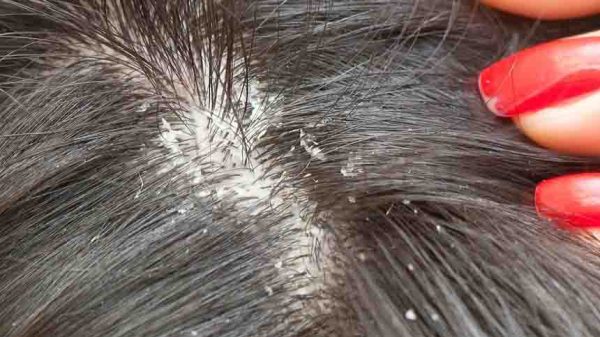Dealing with dandruff in winter

- Update Time : Saturday, 3 February, 2024, 03:47 pm
- 110 Time View

Online Desk: Winter brings with it cosy nights and an excuse to show off trendy winter outfits. However, for many, this season also brings the arrival of an unpleasant guest: dandruff. The cold weather and other reasons can aggravate this common scalp condition, leaving people irritated and looking for effective treatments.
We frequently hear from people that dandruff seems worse in the winter months. But how is it related? The basic explanation is that winter is not the cause of dandruff.
However, people with this condition frequently notice dandruff throughout the winter. Most people assume the flakes on their shoulders are dandruff in the winter, although they are most likely the result of a dry scalp.
Dandruff is typically associated with an excessively oily scalp. Cold weather reduces humidity in the air, leading to dry skin, including the scalp.
As a result of the lack of moisture, the body may overproduce sebum, the skin’s natural oil. It causes an overgrowth of Malassezia yeast. A fungus called Malassezia globosa is the main culprit behind the dandruff problem. Also, hormonal imbalance, weather changes, or stress can trigger your body to produce and secrete excess oil, leading to dandruff.
A dry scalp can easily be confused with dandruff. Both have some similar symptoms. A white, flaky, dry, dead scalp skin is found on the shoulder. Sometimes, they also have an itchy scalp. But they’re two different conditions.
A dry scalp occurs when the skin has too little moisture. The skin on your scalp becomes irritated and flakes off.
On the other hand, dandruff is brought on by an excessive amount of oil on your scalp and an overgrowth of Malassezia, which is already present on your skin. That extra oil causes skin cells to build up and then shed.
Understanding which of these problems you have will help you get the correct treatment and permanently remove the flakes. Usually, dandruff has oily, large yellow or white flakes compared to a dry scalp. The dry scalp has smaller dry flakes.
Dandruff can be managed through home remedies, shampoos, and medical treatments. Using anti-dandruff shampoo can be effective. If one shampoo fails to help, alternate between dandruff shampoos with various active components.
Shampoos containing ketoconazole, zinc pyrithione, coal tar, selenium sulfide, and salicylic acid can be helpful. Follow the instructions on the dandruff shampoo bottle. Follow the directions on the label for how much shampoo to use and how often. When your dandruff improves, you can use dandruff shampoo less frequently.
Some dandruff shampoos must sit on your scalp for 5-10 minutes before rinsing. These instructions can differ depending on the shampoo you choose and your hair texture. Choose your shampoo according to your hair texture and type.
One needs to consult a doctor if dandruff doesn’t go away with dandruff shampoo. Also, dandruff or itching gets worse, the scalp gets red or swollen, and there is red and flaky skin in areas other than your scalp.
There are some natural and home remedies to get rid of dandruff. Tea tree oil, neem, aloe vera, and lemon juice can be helpful to get a dandruff-free, healthy scalp. Neem has fantastic anti-fungal properties so that it can be added to any hair pack, or neem paste can be used directly on the scalp.
Tea tree oil also has anti-fungal properties that help to deal with dandruff. Aloe vera can help with irritation and inflammation caused by dandruff. Aloe vera pulp can be used directly on the scalp.
Lemon juice also can be used directly on the scalp, or you can dilute it with lukewarm water. Apply the juice to the root. It will decrease the amount of grease that builds up on the scalp. Apple cider vinegar is also a very popular and widely used product that can be used to reduce dandruff. Eating healthy and providing your scalp with all the nutrients it needs to be healthy and dandruff-free is important.
















